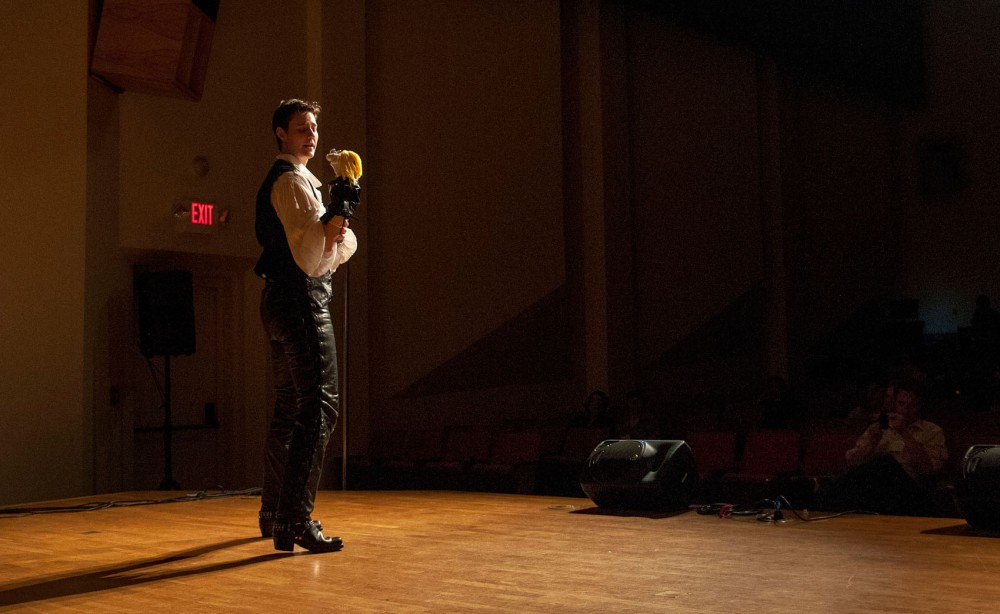When writing a grant to fund last year’s bisexuality conference, University of Minnesota doctoral candidate Lauren Beach didn’t think it would be the only one focused on bisexuality among the thousands of LGBT-related grants in 2011.
“I was really shocked by that because it’s pathetic,” she said.
Beach was one of the organizers for the Bisexual Organizing Project’s 21st annual BECAUSE conference, which featured workshops, keynote speeches, films and performances focusing on the empowerment of the bisexual community.
The conference, held at Augsburg College last weekend, is the nation’s largest and longest-running conference on bisexuality.
Beach gave a presentation on the state of bisexual research, showing that of the nearly $77 million awarded in grant funding for lesbian, gay, bisexual and transgender issues, only $5,000 went to bisexuality in 2011.
Her research showed nonprofit bisexual organizations from around the country raised $48,500 last year — much lower than money that was raised for gay, lesbian and transgender organizations. She also found that the bisexual community still doesn’t have its own national organization.
“We see the disparities are present,” Beach said. “We need specific work to be done in our community.”
Bisexual college students in Minnesota who responded to the Boynton Health Service LGB College Student Health Survey had higher rates of depression than gay, lesbian and heterosexual students.
Bisexual students in the survey also experienced domestic abuse or sexual assault at a higher rate than gay, lesbian and heterosexual students.
Society gives bisexuality ‘a minor role’
This was the first year the conference included an academic component, which gave researchers an opportunity to learn the needs of the bisexual community.
“We want to make sure the researchers who are doing studies on bisexuals can actually talk to people who are bisexual,” said BECAUSE conference chair Randy Frehse.
Frehse, who identifies as straight, said he got involved with bisexual advocacy after his wife came out as bisexual.
Of Minnesota bisexuals surveyed for the 2012 Bisexual Community Needs Assessment, most said they feel more accepted by the straight community than by the gay and lesbian community.
Frehse said bisexuals get lumped in with gay and lesbian identities in mainstream society but sometimes get pushed out as “not gay enough” in gay and lesbian communities.
“Bisexuality tends to become invisible and is marginalized in mainstream society and the GLBT community,” Frehse said.
During workshops, participants voiced their struggles to fit into gay or lesbian communities because of their sexual orientations.
Keynote speakers presented on topics like the existence of male bisexuality, mental health disparities in the bisexual community and bisexual invisibility.
University Curriculum and Instruction doctoral candidate Mary Hoelscher held workshops on how bisexual students are poorly served in K-12 school environments.
She said the umbrella term LGBT often doesn’t seem sufficient to support the needs of everyone under it.
“We need to start taking some extra care and concern to bisexual students,” Hoelscher said. “There’s still a lot of work to be done.”
After attending research and community workshops at the conference, bisexuality educator Heidi Bruins Green, who came from San Francisco to attend, said the conference was a good way for bisexual activists and community members to interact in a way that doesn’t normally happen.
“I want to support a much stronger bi presence in the LGBT community,” Green said. “The B always plays a very minor role.”
Evening entertainment
To add entertainment to the mix, the conference brought in some local performers for a cabaret Saturday night.
The show featured a burlesque dancer, drag king Fox Smoulder performing with a sock puppet to a Meat Loaf song, belly dancers and local nerd-punk band Fuzzy Machete.
Drag queen and cabaret host Janessa Jaye Champagne started off the show dancing to songs by My Chemical Romance and Cher to energize the audience.
Champagne joked about choosing a pink or a blue dress to wear for the show — a tongue-in-cheek reference to how society wants bisexuals to choose between being gay or straight.
“I want to tell people who tell me I have to choose pink or blue to just go [expletive] themselves,” she said.








